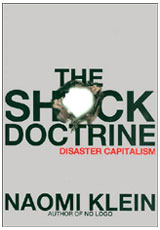Books |
The Shock Doctrine
Naomi Klein
By
Published: Feb 16, 2017
Category:
Non Fiction
How did you feel on 9/12?
So stunned you couldn’t figure out a next move? Desperate for an explanation, any explanation? Filled with a desire for someone powerful to do something big — like strike back?
Many surely felt as New York Times columnist Thomas Friedman did. Here he is, explaining to Charlie Rose why it made sense to invade Iraq, which, as he knew, had nothing to do with 9/11:
We needed to go over there, basically, and take out a very big stick right in the heart of that world and burst that bubble.… What they [Muslims] needed to see was American boys and girls going house to house from Basra to Baghdad and basically saying "Which part of this sentence don’t you understand? You don’t think we care about our open society? You think this bubble fantasy, we’re just going to let it grow? Well, suck on this!"
Naomi Klein had a different take on 9/11. For her, it was like other disasters, natural or political — it gave our government an opportunity for yet another business-take-all power grab.
Klein has no patience with American “goodness” and “good will” and even “democracy” — when the interests of American business are at stake, she argues, idealism goes out the window. Terror, torture, mayhem, murder: The techniques are technicalities. All that counts: the triumph of business interests, a continued flow of money and power to the inner circle.
And this will happen more and more, Klein says, if “disaster capitalism” — that is, “orchestrated raids on the public sphere in the wake of catastrophe” — continues to prevail. The election of Donald Trump? Klein doesn’t speculate. Here’s her closely reported report.
"The Shock Doctrine" is several books in one, and the first is an alternative history of the last 40 years. The tightly-reported, intensely-sourced story Klein tells is not unfamiliar to people outside America and to progressives here at home. Still, to see her connect the dots between Pinochet in Chile and Bremer in Iraq is dazzling and disturbing — this book will be an eye-opener for some, a mind-closer for others. [To buy the paperback of “The Shock Doctrine” from Amazon, click here. For the Kindle edition, click here.]
A cast of thousands sweeps through her book, but only two men are key.
One is the economist Milton Friedman.
The other is Dr. Ewen Cameron, a Canadian psychiatrist.
Even people who know almost nothing about economics have heard of Milton Friedman. He taught at the University of Chicago and influenced generations of students. He advised Presidents and world leaders. He won the Nobel Prize. When he died, in 2006, the obituaries were glowing.
Friedman’s big idea was free markets. He was beloved by conservatives not for his opposition to Marxism but for his rejection of Keynesian economic theory. Unlike Keynes’s liberal disciples, he believed government should, if possible, never meddle with the economy. But that oversimplifies; Friedman’s views were actually more complicated. “Only a crisis — real or perceived — produces real change,” he said. And he advised government leaders in Chile and England to use crisis to introduce radical political and economic re-engineering.
Almost no one can identify Ewen Cameron, but in the 1950s, he did important research for the CIA. Using electroshock, LSD, sustained isolation and other techniques, he showed that he could inflict sufficient shock to a patient’s brain to erase memory. And then he could build a new personality in its place.
Klein’s thesis in “The Shock Doctrine” is that exceedingly clever disciples of Friedman saw how Cameron’s psychological techniques could be used on entire countries. Let’s say a new government comes to power with an ardent pro-business agenda. Instead of changing policy one piece at a time, a new government should shock the population into cowed acceptance of all its new policies.
My guess: Many readers will have trouble with her large perceptions. Like these: In South America, the greatest supporers of “free market” capitalism have been dictators; in the United States, war profiteers are the government; in Iraq, Saddam’s real crime was signing oil contracts with the Russians and negotiating with a French company.
Theories are debatable. It’s with facts that Klein is most compelling. Like these:
In the 1991 Gulf War, the United States dispatched 300 cruise missiles in 5 weeks. In 2003, we fired off 380 in a single day. Between March 20 and May 3, we dropped 30,000 bombs and launched 20,000 cruise missiles, 67% of the total number ever made. “Shock and Awe” — it was literal.
In Thailand, within 24 hours of the tsumani, some developers sent private security guards to fence in beach property they did not own so they could build luxury hotels there.
In New Orleans, FEMA paid a contractor $175 a square foot to put tarp owned by FEMA on the roofs of houses. The workers who actually applied the tarp got $2 an hour.
In the first year of deployment for Iraq, Donald Rumsfeld cut 55,000 jobs in the departments of Defense and Veterans Affairs.
A depressing book? The end is not all doom-and-gloom. Around the world, Klein says, people are understanding how disaster capitalism works — and fighting back. Obviously, she hopes her book will start that process here.
For John Cusack’s interview with Naomi Klein, click here.
For Naomi Klein’s web site, click here.


